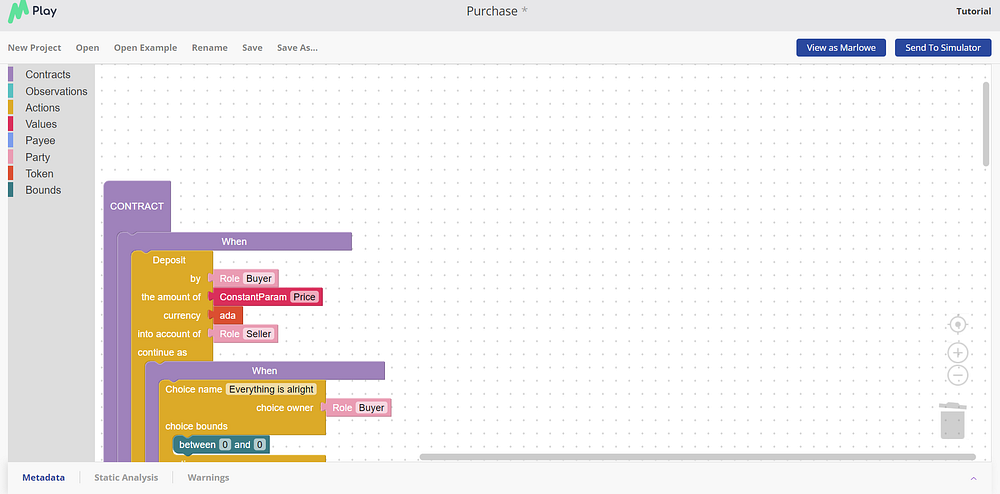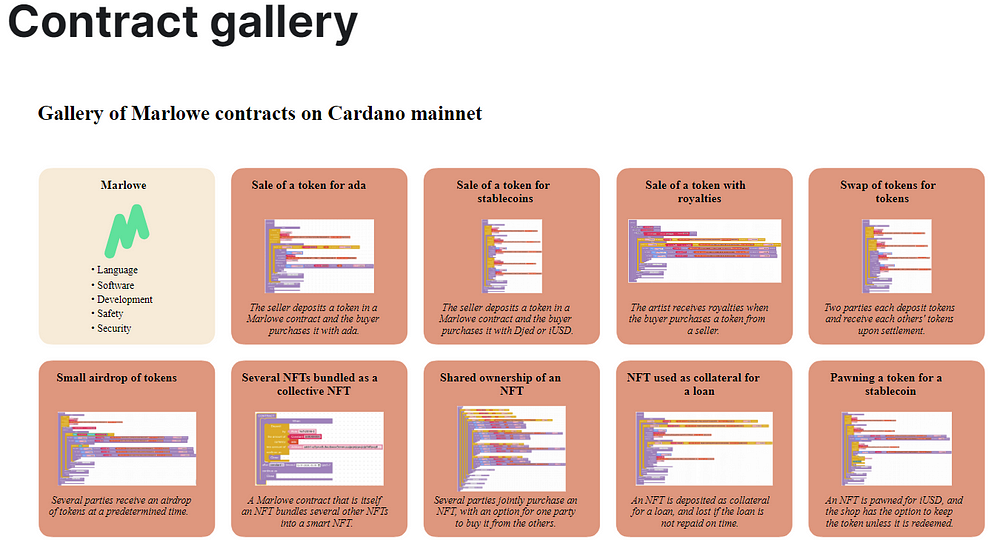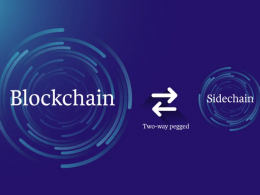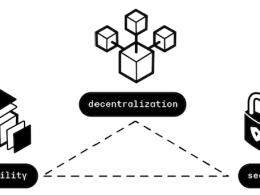The advent of Marlowe onto the Cardano mainnet heralds a new era in the blockchain ecosystem. Following a successful audit, Marlowe offers the global community of early adopters an unprecedented opportunity to explore and test its high-assurance capabilities.
As a powerful toolset, Marlowe presents developers with user-friendly solutions to create, test, deploy, and monetize secure smart contracts with relative ease. By unlocking the full potential of decentralized applications (DApps), Marlowe fosters a burgeoning environment for innovation and user engagement.
Summary
Marlowe’s deployment to the Cardano mainnet is a landmark moment, offering a new domain-specific language that incorporates a web-based platform for creating and visually simulating smart contracts.
With a focus on simplifying the process of building smart contracts, Marlowe eliminates the need to grapple with the intricacies of smart contract languages. This simplicity, combined with robust security features inherited from Plutus and extensive auditing processes, ensures that smart contracts built with Marlowe are secure and reliable.
Additionally, the inclusion of an updated, comprehensive documentation site provides developers with the resources they need to utilize Marlowe fully. With compatibility for JavaScript/TypeScript and Haskell, Marlowe offers developers a familiar and intuitive environment for contract creation.
And, its ability to express contracts on account-based chains and EUTXO accounting models further emphasizes Marlowe’s versatility and potential.
Understanding Marlowe
At its core, Marlowe is a domain-specific language (DSL) designed specifically for building and running smart contracts.
Marlowe’s intuitiveness and simplicity set it apart from its counterparts. Users do not need to understand the intricacies of programming or the technical nuances of a DSL to effectively use Marlowe.
Designed from the ground up for accessibility, Marlowe lifts the complexities of smart contract languages, making it possible for developers to focus on creating, testing, and deploying smart contracts safely and effortlessly.
Exploring the Power of Marlowe
Marlowe is a robust offering that adds significant value to the Cardano ecosystem and the broader blockchain community.
The power of Marlowe lies in its simplicity and versatility, enabling developers to construct smart contracts with speed and ease. Coupled with its ability to seamlessly integrate with DApps and platforms, Marlowe’s toolkit fosters an environment where developers can innovate and build freely.
As Marlowe evolves, the plan is to form strategic partnerships with third-party providers, making it even easier to deploy and run smart contracts through low-code tooling.
Key Features of Marlowe
Marlowe’s deployment on the mainnet comes equipped with a set of powerful features designed to enhance the user experience. At the heart of Marlowe is the Marlowe language, which is the foundational tool for creating smart contracts.
The Marlowe Playground, another critical feature, is an interactive platform for testing and simulating smart contracts before deployment. The Marlowe Runtime and Runtime APIs provide the infrastructure and services for managing Marlowe contracts on the Cardano blockchain.
The Marlowe CLI is a command-line interface that allows users to interact with Marlowe applications.
To assist newcomers, the Marlowe starter kit repository provides tutorials and other useful resources. An integration with Demeter Run simplifies the access to the Runtime backend services, while the updated Marlowe website includes an expanded and integrated documentation site for easy reference.
Together, these features provide a comprehensive toolset for developers to leverage Marlowe to its full potential.
Marlowe Playground
The Marlowe Playground is a significant addition to Marlowe’s arsenal. It is an interactive platform that allows smart contracts to be tested and simulated before deployment.
This feature ensures that the code behaves as intended, placing an emphasis on the contract’s process logic rather than the actual contract code.
The Playground also offers contract builders the ability to simulate contract behavior, allowing them to see how their contracts evolve based on different actions taken by the participants.
By providing the option to write contracts in Haskell, TypeScript, or Marlowe, it caters to a wide range of developer expertise. For beginners, the Blockly visual editor offers a visual way to write and simulate contract behavior, offering a selection of pre-built templates to explore and experiment with.

Contract Templates in Marlowe
To fast-track the smart contract creation process, Marlowe provides a series of customizable, reusable, and ready-made contract templates.
These templates allow contract builders to start creating right away, without the need for starting from scratch. The Marlowe starter kit repository includes three on-chain example contracts — a zero-coupon bond, an escrow, and a swap contract, along with instructions for setting up a suitable ecosystem to run them.
These examples serve as a starting point for developers to understand the potential applications of Marlowe.
Unveiling the Marlowe Runtime
The Marlowe Runtime acts as the application backend for managing Marlowe contracts on the Cardano blockchain.
It is designed to provide easy-to-use, high-level APIs and complete backend services that enable developers to build and deploy enterprise and Web3 DApp solutions using Marlowe, without the need for manual orchestration of backend workflow.
Essentially, Runtime maps between the Marlowe conceptual model and the Cardano ledger model, making it easier for users to discover and query on-chain Marlowe contracts and create Marlowe transactions.
The Runtime backend services can be deployed through Docker, cloud-hosted Runtime extension in demeter.run, or manual deployment using a set of Runtime executables, offering developers flexibility and ease of use.
Expanding Documentation and Tutorials
Marlowe now boasts an extensively expanded, updated, and integrated documentation portal, accessible via a single URL on the updated Marlowe website.
This repository of information offers a plethora of examples, written tutorials, video tutorials, and documentation of Marlowe developer tools. From deployment options to developer resources, the documentation page provides all the necessary guidance to navigate Marlowe’s ecosystem successfully.
It serves as a one-stop resource for developers seeking to learn more about Marlowe and how to leverage its full potential. Furthermore, it offers a platform for users to contact the Marlowe team for support questions and feedback, reinforcing Marlowe’s commitment to its user community.
Safeguarding Smart Contracts with Marlowe
Safety and security are fundamental tenets of Marlowe’s design, bearing in mind the complexity and critical nature of smart contracts.
Recognizing the potentially catastrophic consequences of bugs or flaws in the coding of smart contracts, Marlowe has been meticulously designed to prioritize safety. It harnesses the power and security features of Plutus, with additional safety measures to ensure a secure smart contract experience.
With static and dynamic audits conducted by both Input Output Global (IOG) and an external firm, Marlowe significantly reduces the need for individual contract auditing, thus conserving valuable time and resources.
Moreover, Marlowe contracts can be modeled using the Algorithmic Contract Types Unified Standard (ACTUS), which ensures compatibility with any standardized financial contract specification.
The Intuitiveness of Marlowe
Marlowe’s compatibility with popular programming languages like JavaScript, TypeScript, and Haskell offers developers an intuitive way to create, integrate, and deploy contracts right out of the box.
Its intuitiveness is further amplified by the Marlowe Playground, which provides a visual editor for writing and simulating contract behavior.
This user-friendly Blockly visual editor offers a straightforward approach, allowing contract components to be assembled like building blocks, ensuring that they fit correctly in the right place.
Diverse Use Cases for Marlowe
The Marlowe framework opens the door to a myriad of potential use cases across multiple industries and verticals.
While the initial iteration is primarily designed for financial contracts, Marlowe’s flexible design allows it to be adapted for many other contract types, enhancing its applicability in a variety of sectors.
Whether it’s exploring the contract gallery or diving into the Marlowe starter kit repository for examples, the broad range of potential applications showcases Marlowe’s capacity to power a vast and diverse set of use cases.

Expressiveness in Marlowe
The expressiveness of Marlowe lies in its ability to articulate contracts not only on account-based chains but also on EUTXO accounting models.
By leveraging Cardano’s EUTXO model, Marlowe achieves a high degree of expressiveness, enabling developers to articulate a diverse array of contract terms and conditions. This expressiveness empowers developers to innovate and design smart contracts that cater to a broad spectrum of needs and scenarios, underlining Marlowe’s versatility and potential.
The Dawn of Marlowe
Marlowe’s journey is only just beginning, but its potential to revolutionize the smart contract landscape is immense. With the launch of Marlowe on the Cardano mainnet, developers now have a powerful, intuitive, and secure toolset at their disposal to create and build smart contracts with ease.
As Marlowe continues to evolve and mature, it promises to enhance the value not just for the developer community, but also for the broader Cardano ecosystem. With Marlowe, the complexity of creating and deploying smart contracts is no longer a hindrance but an opportunity for innovation and growth.










